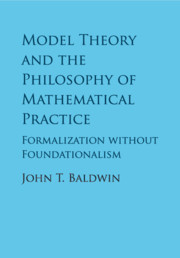PART I - REFINING THE NOTION OF CATEGORICITY
Published online by Cambridge University Press: 19 January 2018
Summary
We reported in the introduction (page 15) several questions raised by Mic Detlefsen. In less precise fashion, they were: Is it better for a theory to be categorical or not? How do we justify whether categoricity is a virtue for a theory? Is completeness a good approximation to categoricity? This part has several themes that together respond to these questions.
The exact modern meaning of such terms as vocabulary, theory, and logic significantly influences the answer to these questions. These meanings were developed to address epistemological concerns.
The answers to such questions as these are highly dependent on the logic in which the theory is formalized. While a strong logic makes it easier to find categorical theories, this may in fact be a disadvantage. Too many theories may be categorical. The axiomatizationmay obscure the fundamental ideas of the area.
We precisely define our notion of a ‘virtuous property’.
We argue that ‘categoricity in power’ and ‘completeness’ are virtuous properties that spawned a family of others resulting in the role of modern model theory as both a mathematical tool and a schema for organizing mathematics.
Chapters 1 and 2 lay out the basic mathematical and philosophical (respectively) terminology of this book. Chapters 1.1 and 1.2 primarily address theme (1). Chapter 1.3 clarifies the role of various logics while properties of theories and axioms are examined in Chapter 1.4. Chapter 2 addresses philosophical issues about our notion of formalization. First we stress that it is a process and then we distinguish two possible goals: foundational and instrumental. Chapter 2.3 expounds the criterion of theme (3). Chapter 2.4 outlines how these virtuous properties can serve as organizing principles for mathematics and introduces the stability hierarchy, a set of virtuous properties that provide a specific method for such an organization that has powerful consequences for finding invariants for models.
These distinctions underlie the argument in Chapters 3.1 and 3.2, which deal with theme (2). Chapters 3.3 and 3.4 develop the notion of categoricity in power, whose powerful consequences in finding invariants for models signal the importance of studying classes of theories. Thus we initiate the study of the paradigm shift which occupies Part II.
- Type
- Chapter
- Information
- Model Theory and the Philosophy of Mathematical PracticeFormalization without Foundationalism, pp. 29 - 30Publisher: Cambridge University PressPrint publication year: 2018



